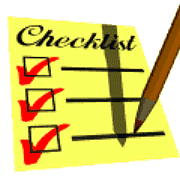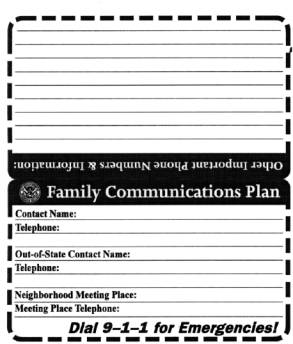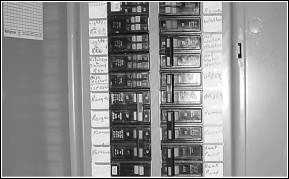
This article will provide you and your family checklists to plan for many different emergency situations. Situations covered are:
- Escape routes.
- Family communications.
- Utility shut-off and safety.
- Insurance and vital records.
- Special needs.
- Caring for animals.
- Safety Skills
Escape Routes
Draw a floor plan of your home. Use a blank sheet of paper for each floor. Mark two escape routes from each room. Make sure children understand the drawings. Post a copy of the drawings at eye level in each child's room.
Where to Meet
Establish a place to meet in the event of an emergency, such as a fire. Record the locations on the plan:
- Near the home For example, the next door neighbors telephone pole
- Outside the immediate area For example, the neighborhood grocery store parking lot
Family Communications
Your family may not be together when disaster strikes, so plan how you will contact one another. Think about how you will communicate in different situations.
Complete a contact card for each family member. Have family members keep these cards handy in a wallet, purse, backpack, etc. You may want to send one to school with each child to keep on file. Pick a friend or relative who lives out-of-state for household members to notify they are safe.
Below is a sample contact card. A copy of the card and your Family Communications plan should also be included in your family disaster supplies kit.

Utility Shut-off and Safety
In the event of a disaster, you may be instructed to shut off the utility service at your home.
Below is some general guidance for shutting off utility service:
Modify the information provided to reflect your shut off requirements as directed by your utility company(ies).
Natural Gas
Natural gas leaks and explosions are responsible for a significant number of fires following disasters. It is vital that all household members know how to shut off natural gas.
Because there are different gas shut-off procedures for different gas meter configurations, it is important to contact your local gas company for guidance on preparation and response regarding gas appliances and gas service to your home.
When you learn the proper shut-off procedure for your meter, share the information with everyone in your household. Be sure not to actually turn off the gas when practicing the proper gas shut-off procedure.
If you smell gas or hear a blowing or hissing noise, open a window and get everyone out quickly. Turn off the gas, using the outside main valve if you can, and call the gas company from a neighbors home.
CAUTION - If you turn off the gas for any reason, a qualified professional must turn it back on. NEVER attempt to turn the gas back on yourself.
Water
Water quickly becomes a precious resource following many disasters. It is vital that all household members learn how to shut off the water at the main house valve.
- Cracked lines may pollute the water supply to your house. It is wise to shut off your water until you hear from authorities that it is safe for drinking.
- The effects of gravity may drain the water in your hot water heater and toilet tanks unless you trap it in your house by shutting off the main house valve (not the street valve in the cement box at the curb - this valve is extremely difficult to turn and requires a special tool).
Preparing to Shut Off Water
- Locate the shut-off valve for the water line that enters your house.
- Make sure this valve can be completely shut off. Your valve may be rusted open, or it may only partially close. Replace it if necessary.
- Label this valve with a tag for easy identification, and make sure all household members know where it is located.

Electricity
Electrical sparks have the potential of igniting natural gas if it is leaking. It is wise to teach all responsible household members where and how to shut off the electricity.
Preparing to Shut Off Electricity
- Locate your electricity circuit box.
- Teach all responsible household members how to shut off the electricity to the entire house.
FOR YOUR SAFETY: Always shut off all the individual circuits before shutting off the main circuit breaker.
Insurance and Vital Records
Obtain property, health, and life insurance if you do not have them. Review existing policies for the amount and extent of coverage to ensure that what you have in place is what is required for you and your family for all possible hazards.
Flood Insurance
If you live in a flood-prone area, consider purchasing flood insurance to reduce your risk of flood loss. Buying flood insurance to cover the value of a building and its contents will not only provide greater peace of mind, but will speed the recovery if a flood occurs. You can call 1 (888) FLOOD29 to learn more about flood insurance.
Inventory Home Possessions
Make a record of your personal property, for insurance purposes. Take photos or a video of the interior and exterior of your home. Include personal belongings in your inventory.
You may also want to download the free Household and Personal Property Inventory Book from the University of Illinois to help you record your possessions.
Important Documents
Store important documents such as insurance policies, deeds, property records, and other important papers in a safe place, such as a safety deposit box away from your home. Make copies of important documents for your disaster supplies kit. (Information about the disaster supplies kit is covered later.)
Money
Consider saving money in an emergency savings account that could be used in any crisis. It is advisable to keep a small amount of cash or traveler's checks at home in a safe place where you can quickly access them in case of evacuation.
Special Needs
If you or someone close to you has a disability or a special need, you may have to take additional steps to protect yourself and your family in an emergency.
Steps for individuals with disability and special needs in the event of an emergency:
- Hearing impaired: May need to make special arrangements to receive warnings.
- Mobility impaired: May need special assistance to get to a shelter.
- Single working parent: May need help to plan for disasters and emergencies.
- Non-English speaking persons: May need assistance planning for and responding to emergencies. Community and cultural groups may be able to help keep people informed.
- People without vehicles: May need to make arrangements for transportation.
- People with special dietary needs: Should take special precautions to have an adequate emergency food supply.
Planning for Special Needs
If you have special needs, find out about special assistance that may be available in your community. Register with the office of emergency services or the local fire department for assistance so needed help can be provided.
- Create a network of neighbors, relatives, friends, and coworkers to aid you in an emergency. Discuss your needs and make sure everyone knows how to operate necessary equipment.
- Discuss your needs with your employer.
- If you are mobility impaired and live or work in a high-rise building, have an escape chair.
- If you live in an apartment building, ask the management to mark accessible exits clearly and to make arrangements to help you leave the building.
- Keep specialized items ready, including extra wheelchair batteries, oxygen, catheters, medication, food for service animals, and any other items you might need.
- Be sure to make provisions for medications that require refrigeration.
- Keep a list of the type and model numbers of the medical devices you require.
Caring for Animals

Animals also are affected by disasters. Use the guidelines below to prepare a plan for caring for pets and large animals.
Guidelines for Pets
Plan for pet disaster needs by:
- Identifying shelter.
- Gathering pet supplies.
- Ensuring your pet has proper ID and up-to-date veterinarian records.
- Providing a pet carrier and leash.
Take the following steps to prepare to shelter your pet:
- Call your local emergency management office, animal shelter, or animal control office to get advice and information.
- Keep veterinary records to prove vaccinations are current.
- Find out which local hotels and motels allow pets and where pet boarding facilities are located. Be sure to research some outside your local area in case local facilities close.
Know that, with the exception of service animals, pets are not typically permitted in emergency shelters as they may affect the health and safety of other occupants.
Guidelines for Large Animals
If you have large animals such as horses, cattle, sheep, goats, or pigs on your property, be sure to prepare before a disaster.
Use the following guidelines:
- Ensure all animals have some form of identification.
- Evacuate animals whenever possible. Map out primary and secondary routes in advance.
- Make available vehicles and trailers needed for transporting and supporting each type of animal. Also make available experienced handlers and drivers. (Note: It is best to allow animals a chance to become accustomed to vehicular travel so they are less frightened and easier to move.)
- Ensure destinations have food, water, veterinary care, and handling equipment.
- If evacuation is not possible, animal owners must decide whether to move large animals to shelter or turn them outside.
Safety Skills
It is important that family members know how to administer first aid and CPR and how to use a fire extinguisher.
Learn First Aid and CPR
Take a first aid and CPR class. Local American Red Cross chapters can provide information about this type of training. Official certification by the American Red Cross provides, under the good Samaritan law, protection for those giving first aid.
Learn How to Use a Fire Extinguisher
Be sure everyone knows how to use your fire extinguisher and where it is kept. You should have, at a minimum, an ABC type.
 Print
Print Email
Email







